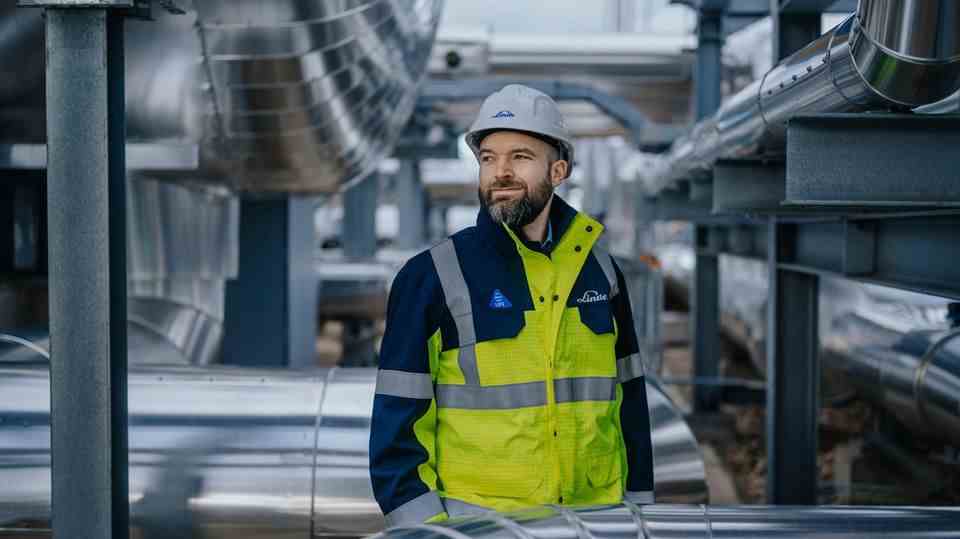TV debate at Anne Will
achieve climate targets? “In the end it will be expensive and hard” – but Jürgen Trittin is still quite satisfied
The group at Anne Will discussed the climate targets this weekend
© Wolfgan Borrs/NDR
Anyone who listened to Professor Lamia Messari-Becker that evening at “Anne Will” was able to realize that there is still hope for the climate and its goals. The reality, however – hello, Berlin! – she resists.
Worldwide, a very drastic reduction in CO2 emissions is necessary this year in order to achieve the target of limited global warming of a maximum of 1.5 degrees. However, the federal government is chronically at odds with the measures. While Vice-Chancellor Habeck is being criticized for his planned ban on installing conventional oil and gas heating systems, Transport Minister Volker Wissing countered with the decision to allow vehicles with combustion engines after 2035, provided they only use CO2-neutral fuels.
And in Berlin, the vote on the referendum “Berlin 2030 climate-neutral” failed. Perspectives opened up with “Anne Will”, while at the same time the arguments continued behind closed doors in the capital.
Guests at “Anne Will” were:
- Konstantin Kuhle (Member of the Bundestag for the FPD)
- Jurgen Trittin (Member of the Bundestag for the Greens and former Minister for the Environment)
- Jens Spahn (Member of the Bundestag of the CDU and former Minister of Health)
- Lamia Messari-Becker (Professor of Civil Engineering at the University of Siegen)
- Petra Pinzler (Berlin correspondent of “Zeit”)
“Jumped as a tiger, landed as a bedside rug,” was how Petra Pinzler from “Zeit” commented on Wissing’s request, his supposed victory in view of the EU’s decision to stop combustion engines, possibly just a Pyrrhic brand. While Jürgen Trittin extra-sonorously conjured up the “end of a deadlock”, after which it was now time to tackle the pent-up demand, Konstantin Kuhle spoke of the continued existence of a “technology for climate protection”, Jens Spahn rhetorically reached into the moth box: “I’m the firm one Conviction …” – when sentences begin with this phrase at the ex-minister of health, caution is required, or at least an arm’s length distance. Combustion engines will still exist in 2035, says Spahn, who is firmly convinced, because nobody knows what the state of the technology will be in 10 to 15 years, but he has “great confidence in the engineers”.
“The course for a heat transition was not set 30 years ago”
While the male triumvirate in this show circled between fuel subsidies for Christian Lindner’s favorite cars, a look at China and the pros and cons of eFuels, Petra Pinzler and Lamia Messari-Becker went a little more concretely to the point, keyword finger in the wound. A big mistake of the energy transition is the electricity-focused way of thinking. And the clock is ticking: “The course for a heat transition was not set 30 years ago,” says Messari-Becker. It will not be enough to just act with electricity. There would be no options, in the end the goals would be pushed “through a tight bottleneck”, prices and subsidies would rise.
For Petra Pinzler, it’s also about the pace, you have to “do it quickly” because Merkel and Seehofer (“didn’t do anything”) would have overslept it. While the traffic light coalition was struggling behind closed doors in the Chancellery at the time of the broadcast for the closed climate line, Messari-Becker cited figures that once again made it clear how difficult the decision-making situation actually is. In 30 years, emissions in the building sector have been reduced by around 40 percent (in transport only by 1 percent), and it is expected to be another 40 percent in the next seven years. That sounds more than sporty The view? “It ends up being expensive and tough.”
2022
Hot summer, floods, protests – the climate year of extremes in pictures
An alternative to current politics? “We need a climate protection-oriented financial policy,” said Messari-Becker. Citizens must be involved in the planning processes. Countries like Denmark, Sweden and the Netherlands showed how. In Germany, on the other hand, something like the desired heating conversion would sometimes require private investments of 80 to 150,000 euros, mind you for homeowners who are often already of retirement age. The result is social hardship without real climate protection, although there are alternatives, such as the combination of photovoltaics and small heat pump systems.
Why can’t the coalition do it?
“The whole thing has to be discussed as an innovation project,” says Petra Pinzler. At the moment, people are primarily acting according to the motto of turning a blind eye to problems. Basically, this is such a great opportunity for the coalition, although the question is still: “Why can’t they do it?”
At the end, Konstantin Kuhle remarked that the “obsessive processing of Volker Wissing doesn’t matter”, although Wissing was actually no longer an issue during the program. At least, says Trittin forgivingly, this time he and Kuhle didn’t argue so badly. A homeopathically dosed happy ending to this show. Anyway.


